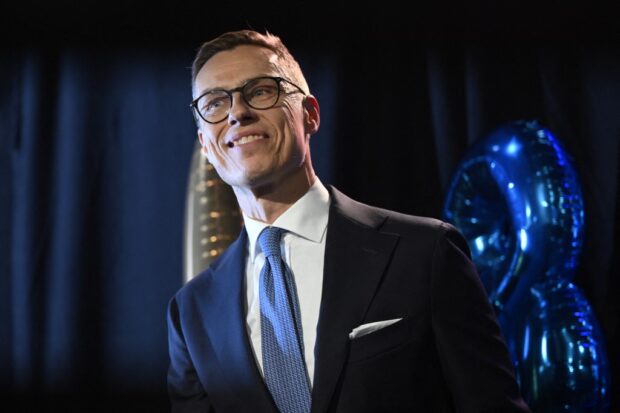Former PM Stubb wins Finland presidential election

National Coalition Party (NCP) presidential candidate Alexander Stubb reacts at his election reception in Helsinki, Finland, on February 11, 2024. Former prime minister, triathlete and Europhile Alexander Stubb secured a triumphant return to politics on February 11, 2024 after a seven-year hiatus, winning the Finnish presidency in Sunday’s election. (Photo by Emmi Korhonen / Lehtikuva / AFP) / Finland OUT
Helsinki, Finland — Former conservative prime minister Alexander Stubb won Sunday’s Finnish presidential election, assuming a role that has gained importance in light of the country’s NATO membership and rising tensions with neighboring Russia.
Some 4.3 million voters were choosing between Stubb and former foreign minister Pekka Haavisto, a Green Party MP running as an independent.
“Well, Alexander. Congratulations to Finland’s 13th president,” Haavisto told Stubb on live television, as he conceded after broadcaster Yle projected that Stubb had won with 51.4 percent.
READ: Finland elects president amid tensions with Russia
When all votes were counted, the final tally gave Stubb 51.6 percent of the vote.
Article continues after this advertisementStubb, who called the win “the greatest honor of my life,” will assume office on March 1.
Article continues after this advertisementThe changing geopolitical landscape in Europe will be the main challenge for the new head of state, who — while having limited powers compared to the prime minister — guides the country’s foreign policy together with the government and acts as supreme commander of Finland’s armed forces.
“It is absolutely incredible that a country the size of Finland can have such a fair and honest election in this security policy context,” Stubb declared in a victory speech to supporters.
Relations between Moscow and Helsinki deteriorated following Russia’s 2022 invasion of Ukraine, prompting Finland to drop decades of military non-alignment and join NATO in April 2023.
Russia, with whom Finland shares a 1,340-kilometer (830-mile) border, swiftly warned of “countermeasures.”
Demanding situation
“The International political situation is really demanding for us at the moment and I think we really need a president who can work with different political parties and who can negotiate,” 46-year-old doctor Maarit Tarkiainen told AFP in Helsinki.
Stubb came out ahead in the first round on January 28 with 27.2 percent, while Haavisto came in a close second with 25.8 percent of the vote — qualifying them for the second round.
In the post-Cold War period, Helsinki maintained good relationships with Moscow.
Outgoing president Sauli Niinisto, first elected in 2012, once prided himself on his close ties with Russian leader Vladimir Putin before becoming one of his most trenchant critics.
Niinisto contacted him directly to announce the decision to join NATO.
Since then, there has been radio silence and Sunday’s winning candidate won’t be expecting a phone call from the Kremlin.
In August 2023, Finland observed an influx of migrants entering through its eastern border without visas.
Helsinki claimed Moscow was pushing the migrants to destabilize it and, in response, closed their border in November — a move supported by both candidates.
“I believe that he will be able to navigate both multilateral cooperation and bilateral relations, which is what is needed, and he will probably also understand the general picture of foreign and security policy,” Hanna Ojanen, research director of politics at Tampere University, told AFP after Stubb’s win.
Stubb and Haavisto, who have both served as foreign minister, shared similar visions for the country’s position towards Russia, calling for additional sanctions against Moscow and support for Ukraine.
“The very strong support for Ukraine will certainly continue. Issues will start to appear on the agenda where Russia is involved in one way or another, which will have to be resolved,” Ojanen said.
A new kind of president
Before joining his victory party in central Helsinki, Stubb stopped by Haavisto’s party.
“You are one of the finest people I have ever met,” Stubb told Haavisto — who has made three unsuccessful runs for president.
Going into the election, analysts had noted that the two candidates were largely aligned on major policy issues, so the differences have been nuances, such as the storage or transport of nuclear weapons in Finland, according to Helimaki.
Stubb has said that the country should not exclude “any part” of NATO’s nuclear deterrence, while Haavisto did not want the weapons on Finnish soil.
Theodora Helimaki, doctoral researcher in political science at the University of Helsinki, believes Stubb will come across as “a slightly new kind of president” for Finns.
“He’s much more outgoing, perhaps, than others… Perhaps a little more international in many ways, and especially when it comes to the way he expresses himself, the way he speaks and so on,” Helimaki told AFP.